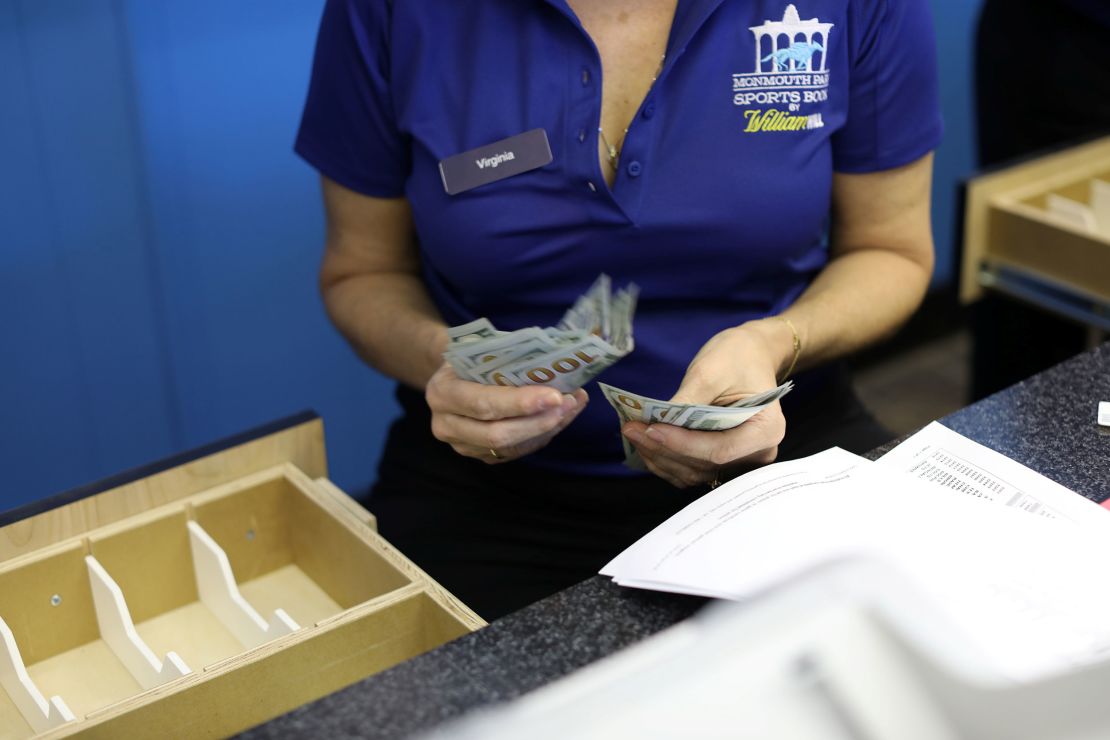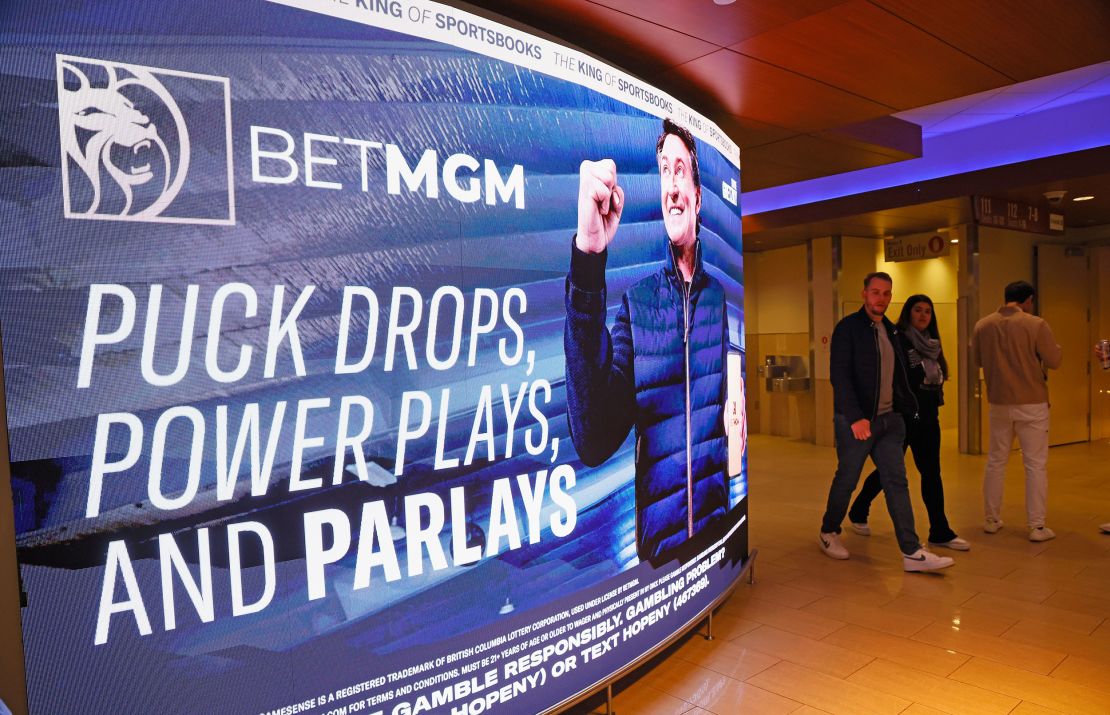CNN
—
It has been an uncomfortable few days for US sports and betting.
Earlier this week, Ippei Mizuhara, longtime interpreter of Japanese baseball star Shohei Ohtani, pleaded guilty in court to fraud and tax charges for stealing almost $17 million from the Los Angeles Dodgers slugger to pay off gambling debts.
The hearing came on the same day that Major League Baseball (MLB) banned San Diego Padres player Tucupita Marcano for life after he bet on baseball games, as well as suspending four other players for a year for betting on games while in the minor leagues.
Meanwhile, a Brooklyn man was charged with conspiring with three others to defraud a sports betting company by using inside information from a National Basketball Association (NBA) player to successfully bet on the performance of that player, who was later banned from the league, according to a federal complaint filed this week.
CNN has determined the player is former Toronto Raptors big man Jontay Porter, who was handed a lifetime ban from the NBA after an investigation found that the 24-year-old had violated betting rules.
“Fans and consumers will put up with a lot when it comes to sports – just look at how the vast majority of off-field issues not affecting the integrity of the game tend to fade over time,” David Carter, adjunct professor of management and organization at USC Marshall School of Business, told CNN.
“But matters affecting the integrity of the game have a chilling effect across the board and governing bodies know this is their Achilles heel,” he warned.
Experts agree that since gambling was effectively legalized after a US Supreme Court decision in 2018 – it’s now allowed in 38 states and Washington, DC – the industry has boomed with nearly $120 billion put down in legal sports wagers in the US in 2023, one analysis found.
In February, when the Super Bowl was held, Americans bet $10.49 billion on sports, a 24.8% year-over-year increase, according to the American Gaming Association’s (AGA) gaming revenue tracker.
“You can bet on any game anywhere, professional or amateur, and not only on the game itself, but you can bet on the individual plays in the game. And you can do it from a smartphone just by pressing some buttons,” says Andrew Zimbalist, professor of economics at Smith College.
The popularity of proposition betting, which focuses on individual parts or plays in a game, also opens up numerous possibilities to rig games, according to Zimbalist.
“There are many, many more ways in which gamblers can approach players and say, ‘Look, I don’t need your team to lose,’” he says.
“’All I need to do is have you not score any points in the first minute of the second half … then do whatever you want the rest of the game.’ Well, the athlete is going to feel much more protected in that circumstance than they would if they had to blow a whole game,” he explains.
What Zimbalist describes exemplifies the concern of some fans as to whether they can trust what they are watching.
“One of the reasons why people love sports is because of the uncertainty of the competition,” adds Zimbalist. “The moment the idea comes in that this is really being rigged, it’s being fixed, it’s being manipulated, then the interest in the sport will decline.”

In details that emerged from the federal complaint concerning the alleged illegal betting scheme involving Porter, Brooklyn man Long Phi Pham is accused of conspiring with others who bet that the player would underperform.
Authorities claim that Pham and others convinced Porter, who had significant gambling debts, to withdraw early from certain games so certain bets on game activities, like how many points he scored, would be successful. CNN has sought comment from Pham’s attorney as well as from a representative for Porter.
“Whether on the court or in the casino, every point matters. As alleged, the defendant and his co-conspirators, as well as an NBA player, participated in a brazen, illegal betting scheme that had a corrupting influence on two games and numerous bets,” US Attorney Breon Peace said in a statement.
It was in 2018 that the US Supreme Court struck down a 1992 federal law, which had prohibited most states from allowing sports betting.
Fast forward to 2024 and the gambling industry is engrained in US sports culture with leagues, franchises, players and networks now partnering with betting organizations.
Victor Matheson, a professor of economics at the College of the Holy Cross, says that sports betting has always happened in the US, but that illicit schemes are now being picked up now that betting is legal and sportsbooks can study their customer base and their habits.
Prior to legalization, studies “suggested that maybe as many as 1% of all college basketball games were being manipulated” in the US, Matheson said.
“So that would suggest there were a lot of betting problems before these things became legal that we were just missing. And now because it’s legal, we’re catching it,” he adds.
However, illegal betting has never gone away.
According to the Campaign for Fairer Gambling (CFG), some $40.92 billion in illegal gross gaming revenue was generated across America’s total online gambling marketplace last year.
In Zimbalist’s view, leagues are handing out punishments “so painful and so costly” that they act as deterrents like lifetime bans.
In the case of Porter, NBA commissioner Adam Silver said he was receiving the “most severe punishment” in the form of his lifetime ban in order to protect the “integrity of NBA competition for our fans, our teams and everyone associated with our sport.”
Other leagues with shorter bans are increasing penalties: the NFL last year revised its gambling policy to raise its ban for players who bet on their own team from one to at least two years.
Asked for comment on the issue of betting, a spokesperson for MLB directed CNN to a statement made Tuesday by league commissioner Robert D. Manfred, Jr., who said: “We have been clear that the privilege of playing in baseball comes with a responsibility to refrain from engaging in certain types of behavior that are legal for other people.
“Since the Supreme Court decision opened the door to legalized sports betting, we have worked with licensed sports betting operators and other third parties to put ourselves in a better position from an integrity perspective through the transparency that a regulated sports betting system can provide.
“MLB will continue to invest heavily in integrity monitoring, educational programming and awareness initiatives with the goal of ensuring strict adherence to this fundamental rule of our game.”
CNN has reached out to the NFL and NBA for further comment on how they intend to protect the integrity of their leagues.

Zimbalist and Matheson note that it’s unlikely that US sports’ biggest stars would become embroiled in betting schemes because they are already paid tens of millions of dollars a year.
“The actual players involved are extremely low profile. These are not LeBron James, Patrick Mahomes. These are not the Connor McDavid’s of the world,” Matheson explains.
Zimbalist adds that “mediocre” or newer, less established players on a lower salary might be more susceptible to agreeing to rig a game.
“That person is much more likely to feel aggrieved and taken advantage of and hence be more susceptible.”
Carter also points out that governing bodies are working with tech companies in order to better catch illicit schemes.
“Leagues and governing bodies are doing as much as they can; especially when attempting to balance revenue generation, league policy, and external relations. Sometimes it seems similar to the IRS – just as one (sports gambling) loophole or workaround is shut down, another arises,” he adds.
However, as Zimbalist points out, TV broadcasts for sports have become so mainstream that fans can’t watch games or read game reports without being bombarded with advertisements from sports books.
Meanwhile research suggests that individuals in the US with gambling disorders have the “highest suicide rate of any addiction disorder.”
“I don’t think we have the resources, the educational systems in place now,” says Zimbalist.
“We need legislation to do things like prevent sports betting advertising, and to prevent prop betting. We need some kinds of constraints, because the problem is much too big to just let the marketplace take over and people become more and more addicted or hooked on gambling.”
A 2023 NCAA study surveyed young adults aged 18-22, finding that among those who had seen sports gambling advertisements, 58% said it made them more likely to want to gamble.
Among higher risk gamblers, about 80% say the ads they have seen make them more likely to gamble.
It’s estimated that 2.5 million adults in the US “meet the criteria for a severe gambling problem in a given year,” according to the National Council on Problem Gambling (NCPG).
However, it can be often in leagues’ financial interest for betting to increase in popularity. For example, the NFL made over $130 million last year alone in gambling sponsorship deals. That’s more than 5% of the league’s total sponsorship revenue.
“The sports leagues have turned to sports betting because it increases fan avidity. More fans will watch more games when people are betting on it and pay more attention to the news, talk more about the games,” Zimbalist says.
“Leagues also make deals with sports books where they sell them data so they can have enough instantaneous data betting play after play – they take the share of the total amount that’s bet, they charge fees.
“The sports industry looks at these developments, unfortunately, as salutary for their economic health, at least in the short run and generates more revenue. And because then, because the overwhelming drive in these leaks is economic — owners want to make money and they want the value of franchises to go up,” he adds.
CNN’s Thomas Schlachter contributed reporting.

